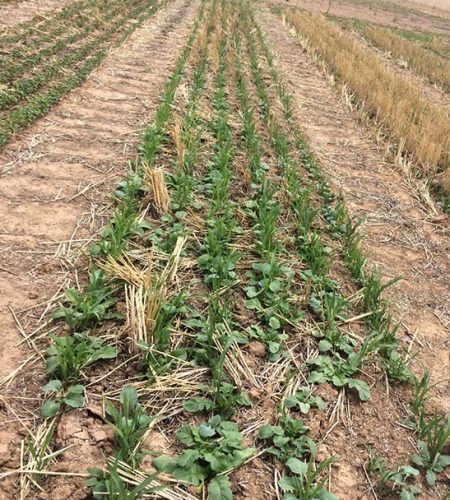This fact sheet supports the ‘Improving soil health with a focus on plants’ webinar hosted by Soil CRC Community of Practice participants Holbrook Landcare Network and Upper Hopkins Land Management Group. Nuffield Scholar Robin Tait facilitated the discussion with Lockington farmer Grant Sims and Soils Adviser Declan McDonald.
Overview
A growing number of farmers are attempting to restore or improve the performance of Australian soils using regenerative practices that are designed to build soil carbon.
Regenerative agriculture seeks to enhance synergetic relationships that build organic matter and increase soil carbon, using a range of practices including no-tillage, cover crops, crop rotations, intercropping, integrated livestock management, increased biodiversity and diversification, reduced inputs of synthetic fertilisers and biocides, and the addition of biological products such as compost, seaweed extracts, fish hydrolysates and vermicast.
By optimising soil carbon functionality, these practices aim to increase plant and animal performance.
Crop Diversity
Planting various crops in appropriate seasons, such as forage crops suited to the climate and soil, can yield benefits.
- Weed control: Diverse crops provide effective weed control through ground coverage.
- Nutrient cycling: Crop diversity promotes efficient nutrient cycling. It introduces nitrogen-fixing and phosphorus-solubilising plants, enriching the soil.
- Microorganism diversity: Diverse crops support a diverse population of microorganisms, enhancing soil health.
Root Diversity
Root diversity is an often-underestimated aspect of farming. By cultivating a variety of root structures, farmers can maximise nutrient and water efficiency.
- Exploring greater soil areas: Different root architectures explore distinct soil areas, optimising nutrient and water uptake.
- Sharing through fungal associations: Diverse plants can share nutrients and minerals through fungal associations, creating a more balanced ecosystem.
- Innovative solutions: For example, introducing buckwheat, known for solubilising phosphorus, can significantly increase biomass and nutrient availability for other crops.
Legumes
Legumes’ nitrogen-fixing abilities are an invaluable asset for sustainable farming.
- Enhanced nitrogen fixation: Legumes, when planted near scavenging crops like wheat and radishes, may double nitrogen fixation due to reduced competition for resources.
- Root exudates: The root exudates of legumes, like clovers, play a crucial role in breaking down calcium-phosphorus bonds in the soil, contributing to a healthier soil ecosystem.
- Reducing urea dependency: Strategic planting of legumes can reduce the need for urea or synthetic nitrogen inputs.
Controlled Traffic Farming
Controlled traffic farming is a practice that reduces soil compaction and enhances overall soil health.
- Reducing soil disturbance: Minimising tillage preserves soil structure, enabling better water infiltration and root growth.
- Creating habitat: Building habitat for beneficial insects and organisms contributes to pest control and soil health.
- Adapting to changing conditions: With diverse and resilient ecosystems, farms are better equipped to handle changing environmental conditions.

